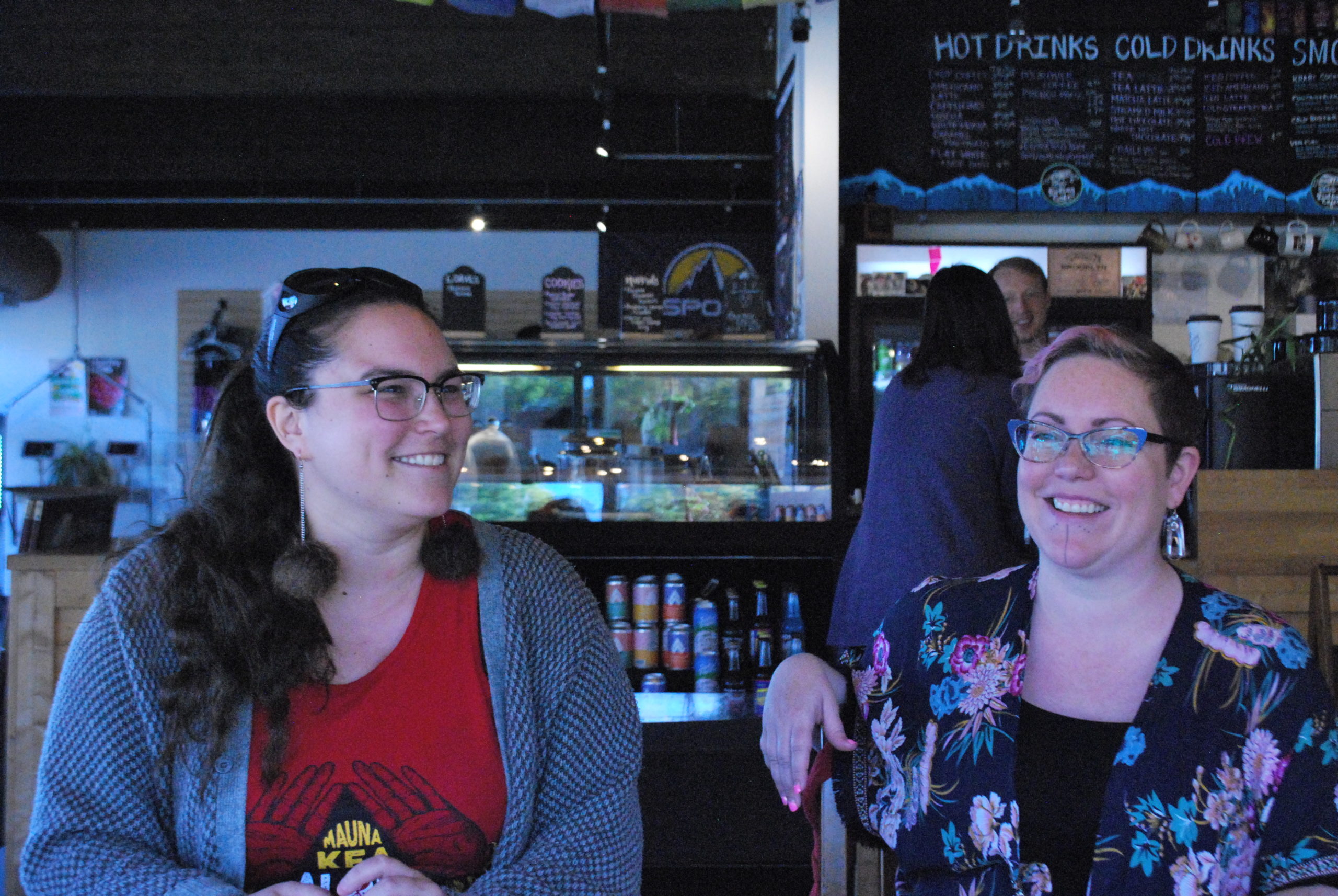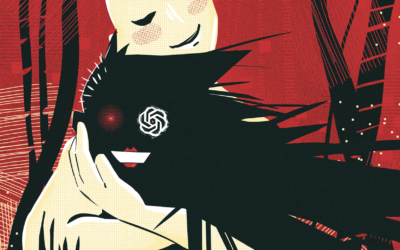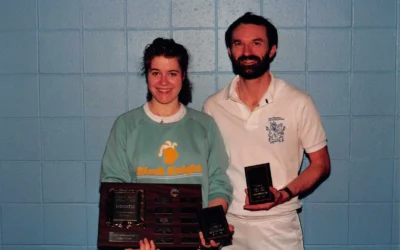Molly Swain and Chelsea Vowel have spent a significant portion of their adult lives studying and talking about the issues faced by Métis and other Indigenous groups in Canada. Much of this has been through their academic work — Swain is a PhD student in native studies at the University of Alberta (U of A), while Vowel has earned an education degree, a law degree, and is currently a Master’s student, also in native studies and also at the U of A — but they engage with the subject on a matter of fronts, whether it be through activism, advocacy, or karaoke.
“Karaoke is the purest distillation of what a communal social equalizer can be right now,” says Swain. “It’s a really resistant practice — it resists capitalist impulses towards things like mastery, monetization, and individualization.”
“Plus, people can totally suck at singing but still put on an amazing performance that really ramps up the energy in the room,” Vowel adds.
About two months ago, the pair laid out plans to embark on a new, very different project from anything they have done before: they are looking to crowdfund the purchase of 160 acres of land in Lac Ste. Anne County, which is within the territory that traditionally belongs to the Métis nation Vowel is a member of, in order to transform it into a “feminist Indigenous compound … to have access to land, teachings, ceremony, and community,” says the GoFundMe page for the project, titled “Back 2 the Land: 2Land 2Furious.” So far, the project has raised just over $15,000 of the hefty $250,000 goal but does not have a deadline.
Swain and Vowel are also known for the podcast they started together about five years ago called “Métis in Space.” A typical episode of the podcast features the two hosts discussing and breaking down a given work of speculative fiction of any genre, but with a strong focus on science-fiction.
“We open a bottle of red wine, watch a show or movie, take some notes, and then just talk about it while we finish that bottle of wine,” says Vowel. “We try to deconstruct the plotline and the tropes that are used, and we always choose something that features indigeneity in some way.”
Though they certainly touch on Indigenous issues regularly during the show, the hosts maintain that the primary goal is to give them something fun to do, that they can take a little less seriously than their other work. Both of them are self-proclaimed nerds — specifically sci-fi fanatics, who can speak on many areas of the genre from classic serial dramas like The X-Files and Star Trek, to epic novels like Dune, to silly comedies like Futurama. While maintaining a less-than-serious attitude, the two take a very critical look at the films or shows at hand, as well as the genre as a whole.
“It started off as a light-hearted way to just trash talk all these works, but then we started to realize that we could start to see consistent elements between them, and we started to actually pick them apart and analyze them,” says Vowel.
To Swain, “one of the most interesting aspects” of sci-fi is the world-building done by the creators. The nature of the genre, of course, means that stories can have settings partially or wholly made up by their authors, that can take radical departures from the observable world we live in. Vowel and Swain both find this aspect so compelling that they decided to do some world-building of their own.
“We call them our ‘shticks’,” says Swain. “They’re like mini episodic adventures that happen within our larger episodes.”
“It allows us to envision something different, outsidethe confines of immediate struggles that Indigenous people face today.”
— Chelsea Vowel
Over the course of the podcast, these shticks have been strung together to weave their own canon, within which Swain and Vowel are the main characters — the eponymous Métis in Space — who live aboard the Métis in Spaceship in orbit of the Earth. The central conceit of the narrative is that they are from 300 years in the future where all colonial attitudes and systems have been done away with. The cosmonauts encounter various sci-fi tropes like alien invasions and tyrannical space-corporations but must deal with these problems using the resources of their hypothetical decolonized utopia. Like in a lot of sci-fi, these often serve as parallels for real-world issues and phenomena. In one not particularly subtle sequence, the characters must deal with an alien who has taken the form of a female Samuel de Champlain, who comes aboard the Métis in Spaceship and announces his plans to take over the Earth.
Part of the reason they began telling their own stories is that Indigenous people are scarcely represented in sci-fi, if at all, says Swain. “It’s often as though we’re not allowed to exist in the future. We’re always already on the way out.”
But the shticks are turning out to play another, rather surprising function.
At a glance, it would seem that Métis in Space and the Back 2 the Land project have no connection to one another, aside from the shared, general enthusiasm for Indigenous and Métis issues that is present in everything Vowel and Swain touch. However, the pair believe that the imaginative speculation that sci-fi allows for is a major component in how they are conceiving the community they wish to create.
“Because we’re huge nerds, we do our theorizing through all the old sci-fi that we love,” says Vowel.
“We can imagine what types of issues will pop up, and ask ourselves how we will deal with them,” says Swain. “How do we deal with conflict without relying on colonial police or court systems? How do we build and maintain good relationships in this new world?”
“Like in all good sci-fi, we’re stepping into the unknown,”
Swain
Of course, the main foundations of the Back 2 the Land project are not rooted in futuristic fantasy. The idea is to create a community based on traditional Indigenous cultural practices and relationships to the land and other people. Here, people could go to learn and teach tactics like sustainable farming as well as spiritual conventions and languages — the site would also ideally play a role in cultural and linguistic revitalization, as have other land collectives like Niimkii Aazhibikong in Ontario and Sagorea Te’ in California.
Swain and Vowel muse at length about the functionally infinite possibilities of what they could see happening on the land. Another key element is that they do not want to assume control, or even ownership of it, in the hopes that each person will bring their own experiences, knowledge, and cultural nuances to the table.
“It’s important to us that the land be placed in a trust because it prevents us from having the type of power that owners have,” says Swain. “We would rather make it more communal, incorporating principles like shared responsibility and unity.”
Another thing they will have to account for is how to adapt old Indigenous models to modern problems — climate change being the big one.
“There’s no new normal anymore,” says Swain. “You can’t just pick up the Farmer’s Almanac anymore and know what to do. It’s going to be about being out there, learning the conditions as they are happening to you.”
To Swain and Vowel, two things are known: they want to create something that does not resemble any community that has come before it, and they don’t know exactly what that will look like. The Métis in Space, however, live in a world where this type of community already exists.
“The way our universe has been playing out, we’ve been using it as a stage to solve problems,” says Vowel. “It allows us to envision something different, outside the confines of immediate struggles that Indigenous people face today. This is useful for coming up with new storylines and plot arcs, but it also allows us to plan out our actual future.”
“Like in all good sci-fi, we’re stepping into the unknown,” says Swain.





0 Comments